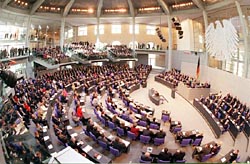Introduction

In organizing its work, Parliament needs to comply with only a few constitutional provisions and legal regulations (e.g. the Federal Electoral Act, the Act on the Legal Status of Members of the German Bundestag). For the rest, however, it is free, in line with the principle of parliamentary autonomy, to organize its work as it sees fit (Art. 40 of the Basic Law: "The Bundestag shall ... draw up rules of procedure."). The Rules of Procedure must be geared to the following guiding principles:
-
The independent mandate:
In accordance with Article 38 of the Basic Law, Members are not bound, in their parliamentary work, by instructions from voters, interest groups, parties, parliamentary groups, etc.; this also applies to any commitment, for example, which they have made to resign their seat under certain circumstances. -
The "plenary's right to be the sole decision-making body":
The forming of the will of the Bundestag must be based on a decision of the plenary. The activities of the bodies set up by the Bundestag only serve to prepare such plenary decisions. This does not rule out constant cooperation between the specialized committees and the appropriate federal ministries. -
The principle of formal equality:
The political groupings represented in Parliament all have the same possibilities of working. Differences resulting from the differing size of these groupings are, however, justified within certain limits. -
The principle of majority voting:
Decisions of the Bundestag in principle require a majority of the votes cast unless the Basic Law provides for exceptions (Art. 42, paragraph (2) of the Basic Law). -
The protection of minorities:
To ensure their possibilities of taking action parliamentary minorities have many different procedural rights, such as the right to move procedural motions, on which a vote must be taken, or the right to make demands which must be met (e.g. the setting up of study commissions, the convening of the Bundestag). -
The principle that sittings are open to the public:
Plenary sittings of the Bundestag must in principle be public (Art. 42, paragraph (1) of the Basic Law). Use has never been made of the possibility of excluding the public.
